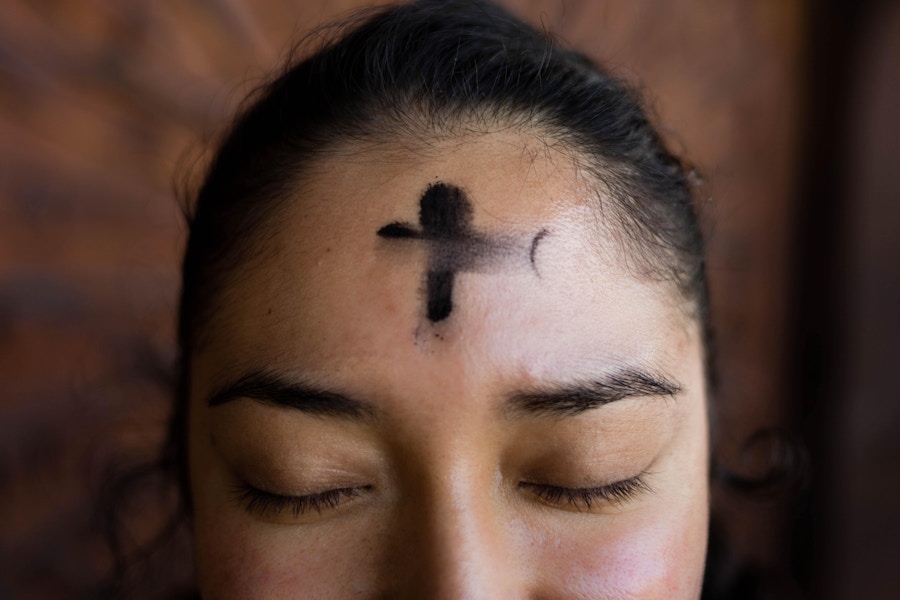On Thursday, September 8, 2022, the news broke that Her Majesty Queen Elizabeth II had passed away in Scotland at age 96. Being a Canadian citizen, I watched plenty of news that day. On the Australian version of The Today Show, one reporter said, “The people loved to know that the prime minister, with all of her or his connections and power, must kneel before the Queen each week at their private audience to give an account to someone more powerful than themselves….It is extraordinary.”
Why Lent?
The picture of kneeling before another person is a jarring image for most Americans primarily because only a few customs in our culture still require it (i.e., prayer or a marriage proposal). Kneeling can also be uncomfortable. The floor may be cold or hard. A weak knee might crack or shake in the process of bending. But that may be the point. Kneeling forces us into postures of discomfort and dis-ease, which we try to avoid. It makes us aware of our weaknesses and limitations, the things we try to mask. Thus, kneeling is a perfect image for Lent. It may be uncomfortable, but it is only from the position of kneeling that we can get low enough to look up.
The season of Lent brings us low by reminding us that we are mortal creatures. Human mortality is the symbolic message the priest or pastor enacts when she marks our foreheads with ashes at the end of an Ash Wednesday service with the words, “Remember that you are dust, and to dust you shall return.” The image of dust reminds us that although humans arrive in the world through a birth canal, we are ultimately from the ground. The ashes communicate the same message. Regardless of one’s wealth or social standing, one day every person will be brought low through their reversion into dust. We are inherently lowly creatures.
This truth is worth remembering in a world where power is highly valued. The technologies of the 20th and 21st centuries have given humanity the capacity to cure once-incurable diseases, access information instantly, and communicate globally. We can control signs of aging through medical advances and drastically alter our bodily appearance. These technological developments make life easier and may push the reality of death from our minds. Lent, however, removes this illusion and invites us to be grounded in the oft-forgotten truth — that despite human dominance over the physical world, we remain powerless over death. Lent subverts our hubris.
We Must Give an Account
Outside of my spouse or superiors, there are few people who remind me that I am accountable to others. I keep local, state, and federal laws, knowing that law enforcement will hold me responsible for my actions. And yes, I am mindful of my behavior towards loved ones, family, and friends. But like most who live in the United States, I subconsciously believe the cultural narrative that I am answerable to no one. After all, who is anyone else to judge me?
Scripture, however, tells a different story. Paul, in his second letter to the Corinthians, for example, says, “we must all appear before the judgment seat of Christ, that each one may receive recompense for the things done in the body, according to what he has done, whether good or bad” (2 Cor 5:10). And the author of Hebrews notes that, “Nothing in all creation is hidden from God’s sight. Everything is uncovered and laid bare before the eyes of him to whom we must give account” (Heb 4:13).
Thus, the season of Lent invites us to live the truth that we ultimately answer to God, and we “give an account” to him through both personal and corporate confession. Some may balk at the idea or need for confession. But as Simon Chan says, “Confession is a poignant reminder that we have not yet arrived.”1 Despite our human achievements, we are not the Creator — God is. Personally, we examine our hearts to spot the areas in our lives that remain unsurrendered to God. We may choose to fast from a particular food, technology, or habit to confess our idolatrous attachments and embody our hunger for God. In this way, we join with Jesus when he says, “Man shall not live by bread alone, but by every word that proceeds from the mouth of God” (Matt 4:4). Corporately, we take a focused and honest look at our allegiances. How is allegiance to an “American church” at odds with our fidelity to the Kingdom of God? God calls us to search our collective memory to confess the myriad ways we have sought more cultural power, succumbed to contemporary ideologies, and overlooked injustice. Lent is the time for us to take the words in the prayer of confession seriously:
Most merciful God,
we confess that we have sinned against you
in thought, word, and deed,
by what we have done, and by what we have left undone.
We have not loved you with our whole heart;
we have not loved our neighbors as ourselves.
We are truly sorry and we humbly repent.
For the sake of your Son Jesus Christ,
have mercy on us and forgive us;
that we may delight in your will, and walk in your ways,
to the glory of your Name. Amen.2
The various practices of confession during Lent invite us to get low — to remember that we are still only lowly creatures who are accountable to a compassionate God. “If we confess our sins,” the Apostle John tells us, “he who is faithful and just will forgive us our sins and cleanse us from all unrighteousness” (1 John 1:9). Thanks be to God.
- Simon Chan, Liturgical Theology: The Church as Worshiping Community (Downers Grove, IL: InterVarsity Press, 2006), 132. ↩︎
- The Book of Common Prayer and Administration of the Sacraments with Other Rites and Ceremonies of the Church According to the Use of the Anglican Church in North America: Together with the New Coverdale Psalter (Huntington Beach, CA, CA: Anglican Liturgy Press, 2019), 130. ↩︎
Photo by Annika Gordon on Unsplash
Text First Published February 2023 · Last Featured on Renovare.org February 2023


